Month: September 2013
-
Ally Carter to Pen the Embassy Row Trilogy
Levithan will edit the manuscripts. The first installment is set to be published in 2015. The story stars “a girl [who] goes to live with her grandfather – the most …
-
Children’s Illustrators Contribute to ‘We Art Boston’ Fundraiser
Founded by author and illustrator Joe McKendry, We Art Boston is “an art auction showcasing the work of multiple artists to benefit the Boston Children’s Hospital Emergency and Trauma Fund” …
-
CBC Diversity: First, Know Yourself
An It’s Complicated! — Authentic Voices guest post by author, Diana López.“Write about picking cotton,” my family said when they heard I wanted to be a writer. “Write about how we used the fabric from flour sacks to make our dresses, and how Grandma hates fish because that’s all she ate during the Depression, since it didn’t cost anything for them to go fishing for food.”
Closely examine my family, or any family, and you’ll discover all the drama of a telenovela. Naturally, I wanted to write about being chastised for speaking Spanish, about living on a ranch in San Diego, about my grandmother being “Rosita the Riveter” during World War II. I tried to write those stories. But my only experience working the land comes from fifteen minutes in a field off Old Robstown Road where my parents showed us how to pick cotton. It was interesting to feel the texture, so unlike a T-shirt, which is what I had imagined.
My grandmother might have hated fish, but I loved it. We had a boat that we’d take to Laguna Madre, where we’d compete to see who could catch the most, the biggest, or the strangest. (Once, my brother caught a seagull when it chomped on the bait as he cast.) Back home, Dad filleted the fish in the backyard, the cats begging and fighting over scraps. Then, Mom used cornmeal batter to fry the fish, and we ate, delicately picking meat off tiny bones.
All this to say that my family’s experiences and the emotions associated with them are not exactly mine.
So what do I know about writing from an authentic Mexican American perspective? Of course, I do write from that perspective because that’s who I am, but one of the struggles I’ve faced is matching the expectations of two groups of readers—brown and white. Interestingly, both often expect stories about characters who are recent immigrants, who speak Spanish, who are gardeners, maids, or nannies, and when I write stories about people who fall outside these categories, they are judged as “too mainstream” or “not Mexican enough.”
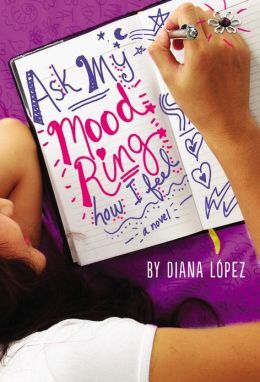
While writing about the “authentic” Latino experience is important, I fear that sometimes other, equally authentic stories get overlooked. For me, these are the stories inspired by my own childhood and by the experiences of my students and sobrinos. Like me, they don’t know what it’s like to work in a field, to go hungry, to use the fabric from flour sacks to make their dresses. Like me, they don’t know what it’s like to speak Spanish beyond a few phrases, and they feel saddened by the inability to have deep conversations with their Spanish-only grandparents but also proud to be fluent, even persuasive, in the English they hear at school, in the neighborhood, on TV.
I used to worry that I wasn’t fulfilling my obligation to write what would be unquestionably categorized as Mexican American literature. But then I had this insight. The Latinos in this country are wonderfully diverse. They come from Mexico, Cuba, and Columbia; they come from San Antonio, Los Angeles, and Winston-Salem. They are gardeners, maids, nannies, dentists, engineers, and mayors.
For those aspiring writers out there, accept that your experience may not fit neatly into a category because in order to write an authentic story, you must first understand and be true to yourself.
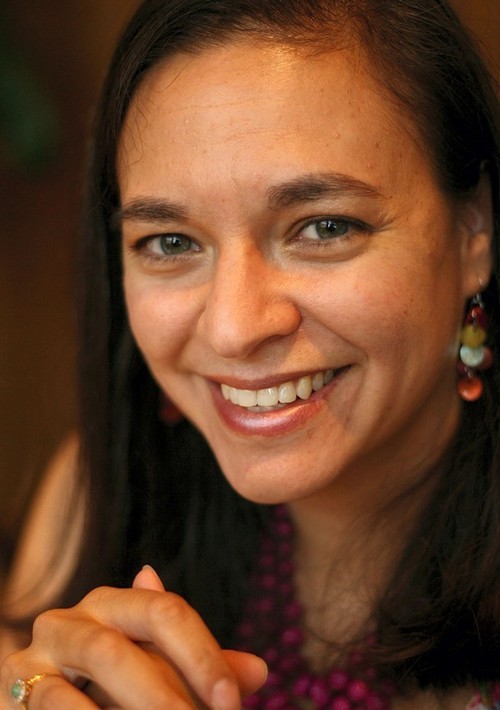
Diana López, author of Confetti Girl, Choke, and Ask My Mood Ring How I Feel.
-
Four Actors Hired for the ‘Mockingjay’ Movie Cast
Julianne Moore, a Golden Globe-winning actress, will play District 13 President Alma Coin. Natalie Dormer, regularly seen on HBO’s Game of Thrones, will take on the role of Filmmaker Cressida. …
-
CBC Diversity: It Doesn’t Have to Be True to Be Truthful
An It’s Complicated! — Authentic Voices guest post by author, Alex London.Authenticity, that vicious guard-dog of truth, bedevils a teller of stories every step of the way. It is not enough to feel the truth of what you write or even to know it. The reader must feel you are right in the telling of it. An inauthentic voice can make even an honest memoir feel like a lie, while an authentic voice can make a whole pack of lies seem true. Just look to James Frey’s first book for proof of that.
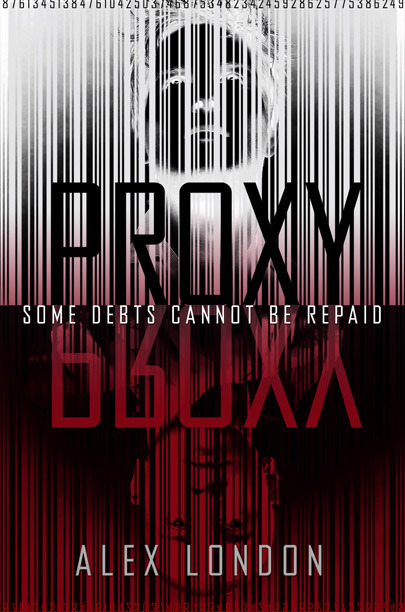
In writing my YA debut, Proxy, I struggled with authenticity early on. As a gay man who was once a gay teen, I had no trouble with my protagonist’s sexuality. I well-remembered the unrequited longings, the suppressed desire for a kiss that sometimes broke out as rage, and the feeling, ever-present, that my sexuality did not define me and that I could not let the world tell me it did.
Syd, one of two main characters in Proxy, contains much of the truth of my own experience and the challenge there was the common challenge to all writing: to make sure I rendered him as vividly as I would want to be rendered myself. I had memories to draw on, fragmented conversations with my straight best-friend, felt truths that I could, with effort, put into words.
The tricky parts were those other pieces of the puzzle that inform the identity of my protagonist, Syd. He is poor, orphaned, dark-skinned. I am none of those things. I share much more in common with the privileged pretty-boy of the story, Knox, who, other than being (quite) heterosexual, resembles young me far more than I’m comfortable admitting. I wrote his privilege to explore, question, reconcile, and problematize my own.
But Syd…we share so little in common. Just because we might have the same romantic inclinations, I couldn’t presume his way of being in the world was anything like mine. To do so would have done the character, and the countless young people in our world whose lives do, to an extent, resemble his, a great disservice. Though set in a dystopian future, I drew much of the world of Proxy from my experiences as a journalist in refugee camps and urban slums around the world, where poverty, power, and competition crash into the free market and send earthquakes through the lives of millions of our world’s young. Syd shares more with those real-life children than with any ghosts of my own teenage years.
So how to write him authentically? At first, I imagined myself a reporter, working once more with the young people I’d met and written about, the child soldiers in the Eastern Congo, the migrants along the Thai-Burma border, the isolated Roma of Kosovo and Bosnia. I began writing Syd for them, with as much empathy and imagination as I could. I quickly realized I could not write this character as a stand-in for any assumptions I had about any group. He’d be a hollow cut out of a person. While those years of research helped me capture the feeling of the slum I invented for Syd to live in, I had to make the character himself whole, with contradictions and complexities born of his circumstances but also born of his unique humanity. He would be ‘authentic’ if I could make him live.
I found my way to Syd’s voice and to all the voices within Proxy the same way any character is conjured from the ether. I tried to imagine him fully. He was not me, nor a stand in for anyone else. He was himself.
It was in writing Syd that I truly came to understand a secret to writing authentically is not to have lived the life your character inhabits—which is impossible in science fiction, and ridiculously limiting in all creative story telling—nor can it simply be produced by years of research—although research sure does help. Authenticity may be the guard-dog of truth, but it can be tamed by a simple technique that’s as challenging and necessary in fiction as in real life: empathy. Authenticity is the end result of writer putting in the work of empathy.
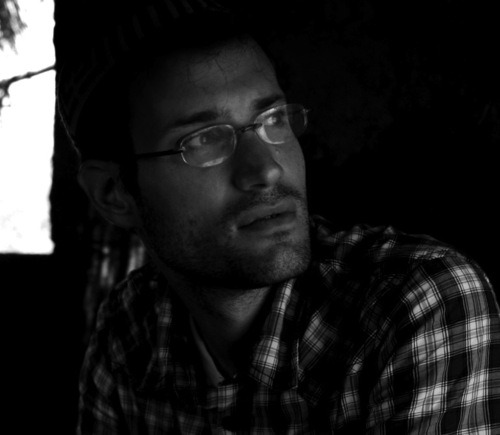
Alex London, the author of Proxy, writes books for adults, children and teens. At one time a journalist who traveled the world reporting from conflict zones and refugee camps, he now is a full time novelist living in Brooklyn. You can visit Alex London at www.calexanderlondon.com
-
Two New YA Books Revisit 19th Century Classics
Summer is officially over: two beloved Gothic novels, Emily Brontë’s Wuthering Heights and Mary Shelley’s Frankenstein are emerging from their graves just in time for Halloween. The Los Angeles Times reports, “Australian …
-
It’s Complicated!: Authentic Voices Series Continues
One week down, one more week to go!Last week this It’s Complicated! series highlighted authors who wrote brilliantly from outside of their perspectives including Graham Salisbury, Elizabeth Kiem, Walter Dean Myers, A.S. King, and Patricia McCormick. Some great takeaways?A writer writes, and doesn’t really worry much about complaints, anyway. We’re seeking the dramatic and emotional intricacies of life wherever and however we can find them. Our job is to explore them, enlighten ourselves, and try our best to move our readers. We may all look different, but we are all intimately and infinitely connected. We are one. We are beings with parallel heartbeats. The only race out there is the human one.—Graham Salisbury, Parallel HeartbeatsMy central characters all have some aspects of my personality. I don’t intend to write this way but it’s inevitable. I know I can use my personal view to create a character of depth, but I have to vary that character so that I’m not constantly writing the same book over and over again.—Walter Dean Myers, Character DevelopmentMy characters are me. I couldn’t write them if they weren’t. None of my characters are autobiographical, but every one of them is human and so am I. In the end, we all have too much in common to go on separating ourselves. We eat and we poop. We are born and we die. We struggle through. While diversity is a celebration of every type of human, I am most interested in that humanness that connects us.—A.S. King, What is Personal Perspective, Really?It’s Complicated!: Authentic Voices continues this week by looking at insider authors who craft outstanding stories featuring protagonists that in some way relate to a part of their personal identity.First up? Alex London, author of the new dystopian novel Proxy. Get ready for some truth bombs later today. To get you started, here’s a teaser from his upcoming post It Doesn’t Have to Be True to Be Truthful:
As always, we look forward to reading your comments and questions that are brought up by any of the posts you read on CBC Diversity. Let’s keep this conversation going, shall we?Just because we might have the same romantic inclinations, I couldn’t presume his way of being in the world was anything like mine. To do so would have done the character, and the countless young people in our world whose lives do, to an extent, resemble his, a great disservice. -
23 Top Illustrators Discuss Their Craft
“I was sickly as a child and gravitated to books and drawing. During my early teen years, I spent hundreds of hours at my window, sketching neighborhood children at play. …
-
Author Meg Medina Recounts Censorship Battle
“The timing could not have been more ironic. September is the month when the American Library Association celebrates Banned Book Week, our annual reminder about the importance of intellectual freedom.” Read the full …
-
Daily Beast to Announce National Book Awards Longlist
“The National Book Foundation, presenter of the National Book Awards, will partner exclusively with The Daily Beast to announce its 2013 Longlists. The categories consist of ten books each from the genres …
-
New James Patterson Series on the Way
2014 will mark the arrival of two new middle-grade series from the prolific James Patterson, bestselling writer of middle-grade, YA, and adult fiction. Homeroom Diaries, cowritten with Lisa Papademetriou, chronicles the life …
-
Publishers Weekly Provides Common Core Toolkit
“As the beginning of the school year gets underway many are continuing to prepare for the Common Core. Schools across the nation are at various stages of implementation. Publishers and …
-
Taking the Risk and Taking the Heat
An It’s Complicated! — Authentic Voices guest post by author, Patricia McCormick.When authors try to write about experiences far outside our own, we run a number of risks. We’ll be accused of getting it wrong, of slumming in someone else’s pain or, worst of all, of being insensitive or patronizing. But for me, it’s only through trying on the experience of another human being that I’m able to recognize the limits of my imagination – and, more importantly, my unconscious biases.

For instance, in Sold, a novel based on my interviews with young Indian and Nepali women who were sold into prostitution, I chose to include a white American character. He is a photographer, based on the real-life activist who introduced me to the issue of human trafficking. It was a thank-you to that young man. But the inclusion of an American character was also a way to give my primary audience a character with whom they could identify.
Some readers criticized the book for repeating the myth of the noble white American rescuer in the land of savages. And upon reflection, I have to plead guilty. If I were to write the book over again, I’d probably base the ‘rescuer’ on the women in India and Nepal who are fighting trafficking. Or on the male police officers now doing that work.
Lesson learned.
My most recent book, Never Fall Down, about a boy who survived the genocide in Cambodia by playing music, is based on the true story of Arn Chorn-Pond. Arn is now a very accomplished man with a college degree. But when he speaks about the genocide, it’s almost as if he becomes that terrified young refugee all over again. Trying to capture that voice was like trying to bottle a lightning bug. When I imposed standard grammar and syntax on it, the light went out. So I chose to mimic that voice in the book.

Some readers complained that the voice was hard to get used to. Some said it was ‘pidgin English,’ a criticism that implies that those who speak non-standard English are somehow intellectually inferior.
But to me, Arn’s voice had a kind of poetry. If anything, it conveyed his keen intelligence, his heart and his humor more than the King’s English ever could. And most readers have said that it’s that voice – that innocent, terrified, lively, funny, lyrical voice – that gets them through the worst of the story.
The danger there was even greater because it risked reducing a real person to a stereotype. But in the end, I think it brought readers closer to him.
I’m currently working on a story about a Haitian girl who lit the spark that ignited the only successful slave revolution in recorded history. As a white woman, I run the risk of getting it wrong, perhaps in ways that a Haitian author might not. But it’s an idea that sprang from my imagination, and something about this story of defiance speaks to me.
It’s a risk, writing outside one’s own racial, socio-economic, gender or ethnic experience. I try to be mindful of criticism of my earlier work; those responses help keep me honest. But the limitations of my own experience pretty much guarantee that I’ll make a mistake somewhere along the way.
In my view, though, it’s precisely by taking those risks – and making mistakes — that we become aware of our blind spots. It’s only when we inhabit someone else’s experience, we see our limitations and biases. And it’s only in stretching the limits of our empathy and imagination that we are able to find what’s universal.
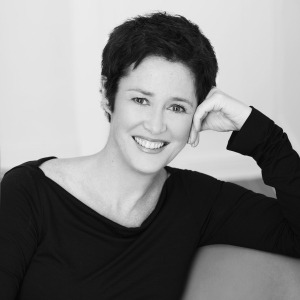
Patricia McCormick, a two-time National Book Award finalist, is the author of five critically acclaimed novels – Never Fall Down, a novel based on the true story of an 11-year-old boy who survived the Killing Fields of Cambodia by playing music; Purple Heart, a suspenseful psychological novel that explores the killing of a 10-year-old boy in Iraq; Sold, a deeply moving account of sexual trafficking; My Brother’s Keeper, a realistic view of teenage substance abuse; and Cut, an intimate portrait of one girl’s struggle with self-injury.
-
J.K. Rowling to Pen Script for ‘Fantastic Beasts & Where to Find Them’ Film
This textbook, whose authorship is attributed to the character Newt Scamander, is first introduced in Harry Potter and the Philosopher’s Stone. Rowling wrote the book and her publishers released it back in 2001. The …
-
CBC Diversity: What Is Personal Perspective, Really?
An It’s Complicated! — Authentic Voices guest post by author, A.S. King.Writing outside of my “personal perspective” is easy because I am fascinated by human beings, and not particularly fascinated by myself.
And what is personal perspective? Is it the body I am in? This physical, sometimes smelly, sometimes sunburnt, sometimes arthritic shell? Is it the color of my skin? The house I grew up in? The amount in my parents’ bank account in 1984? Is it my family’s traditions during holidays? How often we went to church—or the fact that it wasn’t often? This question of personal perspective concerns me because it seems to be the thing a writer is supposed to transcend when he or she writes a novel. It’s also the thing a writer is supposed to plug into. It’s tricky like that.
When thinking about my characters and how they relate to me and more importantly, how they don’t relate to me, I find the dissimilar parts the least important. For example: I am not a young man. I never have been a young man. I am also not a child from a poor home, I’ve never lived in a trailer park, neither have I lived in a gated community of mini-mansions. So how do I write authentically from the point of view of a young man? How do I write authentically from the point of view of a poor girl who lives in a trailer park? A boy who lives in a mini-mansion?
My personal perspective is far wider than my childhood, my skin color, or my sexuality. Every one of my characters is a part of me. Not my shell, but my emotional experience. Emotion knows no race, gender, or tax bracket. When a human being is sad, they are sad, and sadness is not limited to any one type of person. The same goes for love, happiness, anger, jealousy, and list-all-other-emotions-here. Emotions are universal.
I think we live in an allocated world. We like to have sections and subsections and keep everyone in tidy little boxes. I suppose I would fit in the white, raised middle-class, straight box. What is sad about these boxes is that once we put a human inside of one, we take away the possibility of them having experiences outside of the box we assigned to them. This is silly. And dangerous. In life, it leads to being a single-minded, judgmental meathead. In writing, it leads to stereotypical characters. Inventing authentic characters is about a lot more than what we can see from the outside. What’s important, like in life, is the character’s interior. And every one of my characters connects directly to my interior and my emotional experiences, of which I have had many.
My characters are me. I couldn’t write them if they weren’t. None of my characters are autobiographical, but every one of them is human and so am I. In the end, we all have too much in common to go on separating ourselves. We eat and we poop. We are born and we die. We struggle through. While diversity is a celebration of every type of human, I am most interested in that humanness that connects us.
.jpg) A.S. King is the author of the forthcoming Reality Boy and the highly acclaimed Ask the Passengers, which received six starred reviews, appeared on ten end-of-year “best” lists, and was a Lambda Literary Award Finalist and a Los Angeles Times Book Prize winner. Her previous book, Everybody Sees the Ants, also received six starred reviews, was an Andre Norton Award finalist, and was a 2012 YALSA Top Ten Best Fiction for Young Adults book. She is also the author of the Edgar Award–nominated, Michael L. Printz Honor Book Please Ignore Vera Dietz and The Dust of 100 Dogs, an ALA Best Book for Young Adults. When asked about her writing, King says, “Some people don’t know if my characters are crazy or if they are experiencing something magical. I think that’s an accurate description of how I feel every day.” She lives in Pennsylvania with her husband and children, and her website is www.as-king.com.
A.S. King is the author of the forthcoming Reality Boy and the highly acclaimed Ask the Passengers, which received six starred reviews, appeared on ten end-of-year “best” lists, and was a Lambda Literary Award Finalist and a Los Angeles Times Book Prize winner. Her previous book, Everybody Sees the Ants, also received six starred reviews, was an Andre Norton Award finalist, and was a 2012 YALSA Top Ten Best Fiction for Young Adults book. She is also the author of the Edgar Award–nominated, Michael L. Printz Honor Book Please Ignore Vera Dietz and The Dust of 100 Dogs, an ALA Best Book for Young Adults. When asked about her writing, King says, “Some people don’t know if my characters are crazy or if they are experiencing something magical. I think that’s an accurate description of how I feel every day.” She lives in Pennsylvania with her husband and children, and her website is www.as-king.com. -
Gene Luen Yang on the Inspiration for ‘Boxers & Saints’
“As an Asian American, I grew up in both Eastern and Western cultures. When I read books about the Boxer Rebellion, I found myself torn. I couldn’t decide who the …
-
Tumblr Launches First Official Book Club
“…because this is a book club the Tumblr way, you can express your feelings about the book however you choose — a written review, fan art, gifs, poems, letters… Maybe …
-
Character Development
An It’s Complicated! — Authentic Voices guest post by 2012-2013 National Ambassador for Young People’s Literature, Walter Dean Myers.What I knew about the character I wanted to create was that he was based on the Moroccan hero Tarik ibn Zayad. In late April, 711, Tarik led his soldiers across what is now known as the strait of Gibraltar onto the Iberian Peninsula. My problem was to keep the book as time specific as possible while making it interesting to today’s young reader.
Knowing the subsequent influence of Islamic and Moorish culture in Spain, I decided to take the trip to the areas I would be writing about. I took my usual research assistants – my wife Constance and our son Christopher. We flew from Newark Airport to Malaga where we spent a few days checking out the food and staring at the people. Christopher noted that many seemed to be of mixed race. We then rented a car and drove to Granada.
Granada is flat out beautiful, and I knew I wanted to include the lush scenery in my book. So throughout the book I made references to the vegetation and thus gave Tarik a careful and interesting appreciation of the wonders of nature.
Tarik, in my story, is on a mission of vengeance. His family has been killed by Visigoth raiders and he is angry. But, needing to control that anger I gave him martial arts training from two people, one who teaches him to fight and the other who teaches him self control. His character is coming along nicely, thank you.
My character is angry but self-controlled, and I lend him my feelings about his family. If my parents were killed by some tyrant I would be driven to avenge them. Off he goes looking for the bad guy who I make into kind of a hyper-evil dude who doesn’t even have a clear sexual grounding. But my character is too good. He’s pure and wonderful and I need to add some spice to this dish. I find it in a second character, Stria, who is as ferocious a fighter with a sword as is Tarik, but she is almost blinded by her rage against the Visigoths.
My central characters all have some aspects of my personality. I don’t intend to write this way but it’s inevitable. I know I can use my personal view to create a character of depth, but I have to vary that character so that I’m not constantly writing the same book over and over again. In this story there are clear variations. The setting is 8th century Iberia rather than my familiar Harlem. Tarik’s weapon is a sword, rather than a gun. And the largest variation for me, the antagonist is the larger than life figure of an evil conqueror.
We traveled by car (my wife drives, I don’t) from Granada down through the Moorish influenced villages to the southern tip of Spain. We then took a ferry across the strait of Gibraltar into Tangiers, where, allegedly, Tarik once lived.
In Tangiers we mingled in the marketplaces, ate in charming little restaurants, and took pictures of everything. Chatted with grade school boys who called me ‘Ali Baba’ and had a great time. One brown skinned youngster with dark eyes offered me a thousand camels for my wife. I said no. The images I would later use in the book. But more than anything I would use the contrasts between Tarik and the mindless villainy of the Visigoth baddies to create what I hoped would be a memorable character.
 Walter Dean Myers is a critically acclaimed author of books for young people and the National Ambassador for the 2012-2013 term. His award-winning body of work includes Sunrise Over Fallujah, Fallen Angels, Monster, Somewhere in the Darkness, Harlem, and Scorpions. Myers has received two Newbery Honor Awards and five Coretta Scott King Awards. He is the winner of the first Michael L. Printz Award (for excellence in young adult literature, given by the American Library Association) as well as the first recipient of Kent State University’s Virginia Hamilton Literary Award for Lifetime Achievement. He is considered one of the preeminent writers for young people, having written over 100 books.
Walter Dean Myers is a critically acclaimed author of books for young people and the National Ambassador for the 2012-2013 term. His award-winning body of work includes Sunrise Over Fallujah, Fallen Angels, Monster, Somewhere in the Darkness, Harlem, and Scorpions. Myers has received two Newbery Honor Awards and five Coretta Scott King Awards. He is the winner of the first Michael L. Printz Award (for excellence in young adult literature, given by the American Library Association) as well as the first recipient of Kent State University’s Virginia Hamilton Literary Award for Lifetime Achievement. He is considered one of the preeminent writers for young people, having written over 100 books. -
#1 Bestselling Authors Kami Garcia & Margaret Stohl Return to the World of ‘Beautiful Creatures’ with All-New Series
New York, NY – Little, Brown Books for Young Readers will publish Dangerous Creatures, a new young adult book series from Kami Garcia and Margaret Stohl, it was announced today …
-
This Week on Girls Scouts’ The Studio: ‘The Show Must Go On!’ Author Kate Klise
“Everyone tells stories. It’s what our species does, right? It’s what cavemen did, sitting around the fire. I’m guessing it’s what Girl Scouts do at camp, even today. I’m lucky …



















